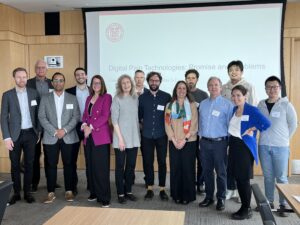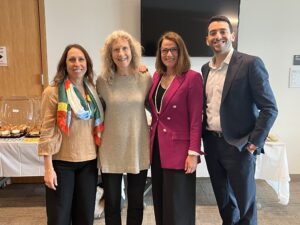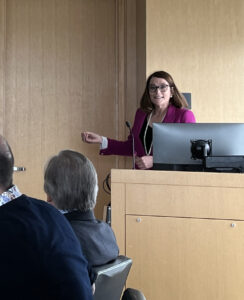 The Alliance to Advance Comprehensive Integrative Pain Management (AACIPM) and National Pain Advocacy Center (NPAC) extend sincere gratitude to Cornell University for hosting an extremely timely and important workshop, Digital Pain Technologies: Promises and Problems, from May 1-2, 2023. Organized by Cornell’s Benjamin Lipp and Stephen Hilgartner from the department of Science & Technology Studies, the workshop brought together academics from social science and technical disciplines, along with health professionals, patient advocates, and companies, around the issue of designing systems of pain management that are more equitable, accessible, and integrated.
The Alliance to Advance Comprehensive Integrative Pain Management (AACIPM) and National Pain Advocacy Center (NPAC) extend sincere gratitude to Cornell University for hosting an extremely timely and important workshop, Digital Pain Technologies: Promises and Problems, from May 1-2, 2023. Organized by Cornell’s Benjamin Lipp and Stephen Hilgartner from the department of Science & Technology Studies, the workshop brought together academics from social science and technical disciplines, along with health professionals, patient advocates, and companies, around the issue of designing systems of pain management that are more equitable, accessible, and integrated.
 Current and converging trends in pain management include an abundance of new and emerging digital interventions, and this raises many questions when thinking about person-centered pain management. These include and often combine digital applications that monitor pain symptoms and behaviors, new generations of wearable neuromodulation devices, as well as telehealth platforms. Next to pain relief, these technologies share the goals of empowering patients outside the clinic, providing better access to care especially in rural areas, and offering new kinds of data to providers as well as patients. However, while there are many success stories and promising products, their prospective integration into new systems of pain management raises a range of ethical, political, and technical questions, such as:
Current and converging trends in pain management include an abundance of new and emerging digital interventions, and this raises many questions when thinking about person-centered pain management. These include and often combine digital applications that monitor pain symptoms and behaviors, new generations of wearable neuromodulation devices, as well as telehealth platforms. Next to pain relief, these technologies share the goals of empowering patients outside the clinic, providing better access to care especially in rural areas, and offering new kinds of data to providers as well as patients. However, while there are many success stories and promising products, their prospective integration into new systems of pain management raises a range of ethical, political, and technical questions, such as:
- How does the availability of digital pain data impact communication between patient and provider?
- Whose claims about pain does digital pain data harness and whose do they discredit?
- What new kinds of vulnerabilities emerge at the device-body interface, such as data leakages or safety issues?
- Does digital integration make pain management more accessible or produce new inequities?
 Among a select group of 15 experts, NPAC Director Kate Nicholson, JD, and AACIPM Director Amy Goldstein, MSW, were invited to add to the workshop’s trans-disciplinary dialogue. While having time together in Ithaca, we decided to co-write this blog to be efficient and help build momentum more broadly. Kate presented Equity, Access & Privacy in Remote Care: Pitfalls and Opportunities; Amy presented Unpacking equitable, whole person, multimodal pain care in the context of responsible, real-world solutions.
Among a select group of 15 experts, NPAC Director Kate Nicholson, JD, and AACIPM Director Amy Goldstein, MSW, were invited to add to the workshop’s trans-disciplinary dialogue. While having time together in Ithaca, we decided to co-write this blog to be efficient and help build momentum more broadly. Kate presented Equity, Access & Privacy in Remote Care: Pitfalls and Opportunities; Amy presented Unpacking equitable, whole person, multimodal pain care in the context of responsible, real-world solutions.
Other participants raised a number of other ethical, policy, and digital concerns that made participants reflect on digital interventions from a more nuanced viewpoint. The collective interest in this workshop was palpably strong and, by workshop’s end, there was unanimous support in participating in next steps, such as a joint statement from the participants and a follow-on meeting.
About her time at the workshop, Amy Goldstein, Director, AACIPM said:
“I am so enthusiastic about the next steps after participating in this workshop! We covered a lot of ground among leaders who sincerely wanted to listen, discuss, and learn from other experts – all to focus on designing responsible systems of pain management that are more equitable, accessible, and integrated. We want to build momentum by continuing to connect more dots.”
